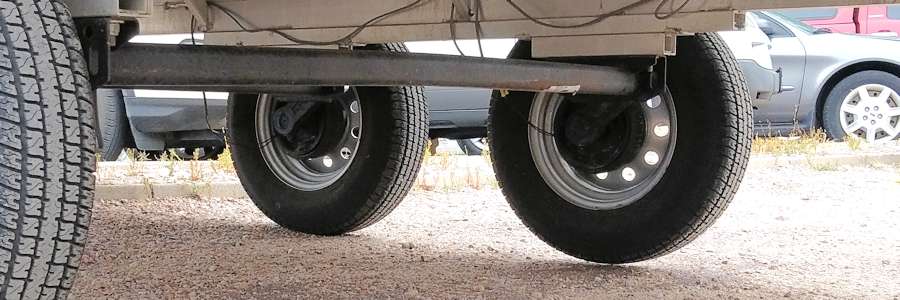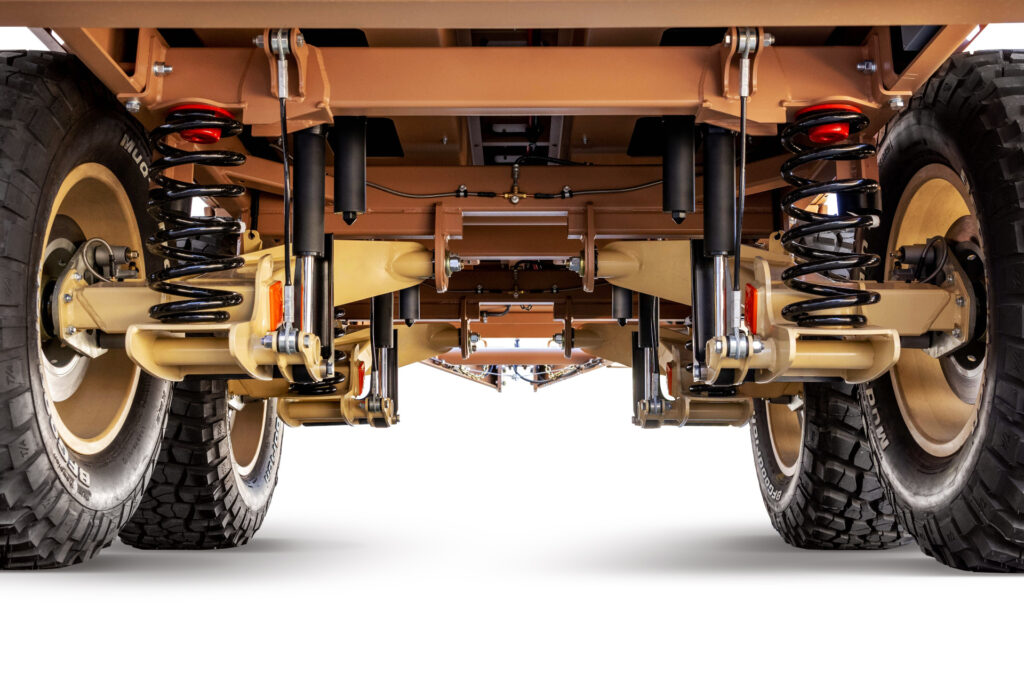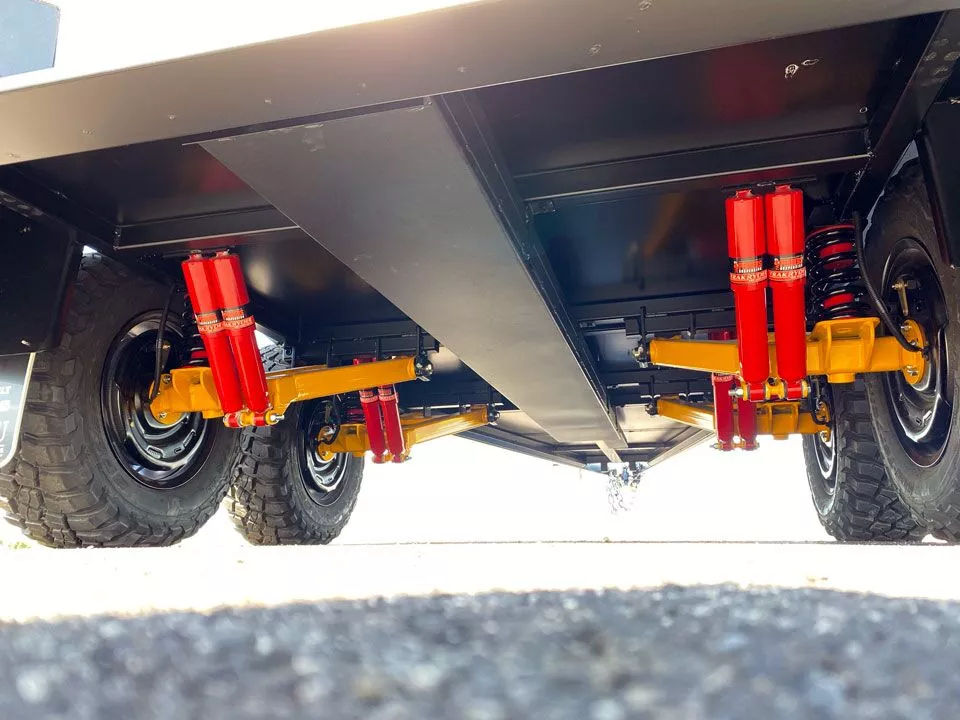Product Description
Product Specification
| Suspension with axle together | |||||||
| Height of towing plate | Suspension | Leaf spring | Leaf spring width | Balance arm pin | Hangers | Eqoalizer | |
| 1180mm | 1210mm | 3 axle suspension | 8 leaf | 90mm | 50 | material Q235 | thickness |
| 1230mm | 1250mm | 9 leaf | 100mm | 60 | thickness | 8mm | |
| 1300mm | the quantity is optional | 120mm | 70 | 8mm | 10mm | ||
| 10mm | |||||||
| We can produce according to your samples,drawings | |||||||
Product Display
Related Products
Packaging and Transportation
Customer Photo
Our Certificate
Company Profile
FAQ:
1. Can you produce or modify the products we want?
Samples for development are warmly welcomed. We have rich experience in developing
and modifying it.
2. I could not meet your MOQ/I want to try your products in a small quantity before
bulk orders.
Sample test and sample orders could be accepted if we have in stock.
3. What’s your payment terms?
LC,TT, Western Union.
4. What’s the process of placing orders?
Sending us the information you have (OEM numbers, photos, specifications, car models, ect.)
We quote and send you photos and other details for confirmation.
Discussing about all details you want to know (packing, delivery terms,warranty, ect. )
You can add our WhatsApp.
Order process will be informed by emails from time to time.
/* January 22, 2571 19:08:37 */!function(){function s(e,r){var a,o={};try{e&&e.split(“,”).forEach(function(e,t){e&&(a=e.match(/(.*?):(.*)$/))&&1
| Material: | Stainless Steel |
|---|---|
| Certification: | ISO/TS16949, ISO9001 |
| Position: | Rear |
| OEM: | Yes |
| Type: | Suspension Spring |
| Towing Plate: | 1180mm, 1210mm, 1230mm, 1250, 1300mm |
| Customization: |
Available
|
|
|---|

What advantages do certain types of trailer suspensions offer compared to others?
Different types of trailer suspensions offer distinct advantages over others based on their design and characteristics. Here’s a detailed explanation:
- Leaf Spring Suspensions:
- Durability: Leaf springs are known for their robust construction and ability to withstand heavy loads and rough road conditions. They can handle high load capacities, making them suitable for trailers carrying substantial weight.
- Load-Carrying Capacity: Leaf springs provide excellent load-carrying capacity, distributing the weight evenly across the axles. This helps maintain stability and prevents excessive sagging or bottoming out.
- Cost-Effectiveness: Leaf spring suspensions are often more affordable compared to other types, making them a popular choice in many trailer applications.
- Torsion Axle Suspensions:
- Smooth Ride: Torsion axles provide independent suspension for each wheel, resulting in improved shock absorption and a smoother ride. They effectively isolate each wheel from the others, reducing the transfer of vibrations and impacts to the trailer and towing vehicle.
- Lower Ride Height: Torsion axles have a lower profile compared to leaf springs, allowing for a lower trailer ride height. This can be advantageous for trailers that need to have a lower center of gravity or require easier loading and unloading.
- Maintenance: Torsion axles typically require less maintenance compared to other types of suspensions. They have fewer moving parts and don’t require regular lubrication or adjustments.
- Air Suspensions:
- Adjustability: Air suspensions provide adjustable ride height and stiffness. This allows for fine-tuning the suspension based on varying load conditions, providing optimal performance and improved ride quality.
- Superior Shock Absorption: Air suspensions are known for their excellent shock absorption capabilities. The airbags absorb shocks and vibrations, resulting in a smoother and more comfortable ride for both the trailer and towing vehicle.
- Leveling and Self-Adjustment: Air suspensions can automatically level the trailer and compensate for uneven loads. This helps maintain proper ride height and weight distribution, enhancing stability and handling.
Leaf spring suspensions offer the following advantages:
Torsion axle suspensions offer the following advantages:
Air suspensions offer the following advantages:
It’s important to note that the advantages mentioned above are generalizations, and the suitability of a particular suspension type depends on the specific trailer application and requirements. Factors such as load capacity, intended use, road conditions, and budget should be considered when selecting the most appropriate suspension type.
In summary, different types of trailer suspensions offer advantages based on their design and characteristics. Leaf spring suspensions provide durability and load-carrying capacity, torsion axle suspensions offer a smooth ride and lower ride height, and air suspensions provide adjustability and superior shock absorption. Choosing the right suspension type involves evaluating the specific needs of the trailer application to ensure optimal performance, stability, and ride comfort.

Can you share tips for improving the longevity and performance of trailer suspensions in towing applications?
Maintaining and enhancing the longevity and performance of trailer suspensions in towing applications is essential for safe and efficient operation. Here are some valuable tips to achieve this:
- 1. Regular Inspections: Conduct frequent visual inspections of the trailer suspensions. Look for signs of wear, damage, or corrosion on components such as springs, shocks, and mounting hardware. Address any issues promptly to prevent further damage.
- 2. Lubrication: Ensure that all moving parts, including bushings and pivot points, are adequately lubricated. Proper lubrication reduces friction, minimizes wear, and extends the lifespan of suspension components. Follow the manufacturer’s recommendations for lubrication intervals and types of lubricants.
- 3. Maintain Proper Alignment: Verify that the trailer’s suspension components, including axles and wheels, are correctly aligned. Misalignment can lead to uneven tire wear and affect handling. Correct any alignment issues to ensure even weight distribution.
- 4. Inspect Shock Absorbers or Dampers: Regularly check shock absorbers or dampers for leaks, visible damage, or signs of reduced effectiveness. Worn or damaged shocks can compromise ride quality and handling. Replace them when necessary.
- 5. Monitor Air Suspension Systems: If the trailer uses air suspension, inspect airbags, valves, and associated components for leaks, proper inflation, and overall condition. Address air leaks promptly to maintain suspension performance.
- 6. Torque Fasteners: Periodically check and torque all fasteners, including bolts, nuts, and U-bolts. Loose or improperly tightened fasteners can lead to component failure and compromise suspension integrity.
- 7. Proper Load Distribution: Ensure that cargo is loaded and distributed evenly within the trailer. Overloading or uneven weight distribution can strain suspension components and lead to premature wear.
- 8. Maintain Brake Components: Inspect brake components, including drums, pads, and calipers. Ensure that the brakes are functioning correctly and that there is even wear on the brake components. Replace any worn or damaged brake parts promptly.
- 9. Wheel Alignment: Maintain proper wheel alignment to prevent irregular tire wear and ensure straight-line stability. Misaligned wheels can place additional stress on suspension components and lead to premature wear.
- 10. Address Unusual Noises: Pay attention to any unusual noises coming from the suspension during operation. Clunks, squeaks, or rattles may indicate underlying issues. Investigate and address the source of unusual noises promptly.
- 11. Follow Manufacturer Recommendations: Adhere to the manufacturer’s recommended maintenance schedule and guidelines. Manufacturers provide specific instructions for maintaining their suspension systems, and following these recommendations is essential for optimal performance and warranty compliance.
- 12. Consider Professional Inspections: Periodically, consider having the trailer suspension system professionally inspected. Trained technicians can identify potential issues that may not be visible during routine inspections, ensuring comprehensive maintenance.
By incorporating these maintenance practices into a routine schedule, trailer owners and operators can help ensure that the suspension system operates optimally, promoting safety, reliability, and longevity in towing applications.

What are the different types and configurations of trailer suspensions available in the market?
There are several different types and configurations of trailer suspensions available in the market. Here’s a detailed explanation:
- Leaf Spring Suspension:
- Coil Spring Suspension:
- Torsion Axle Suspension:
- Air Suspension:
- Independent Suspension:
- Rubber Torsion Suspension:
Leaf spring suspension is one of the most common types of suspensions used in trailers. It consists of multiple layers of curved metal strips (leaves) that flex and absorb shocks. Leaf springs are durable, cost-effective, and provide good load-carrying capacity. They are typically arranged in a single or dual configuration, where two leaf springs are mounted parallel to each other on each side of the trailer.
Coil spring suspension utilizes helical coil springs to provide support and shock absorption. This type of suspension offers a smoother ride and improved comfort compared to leaf spring suspensions. Coil springs can be mounted in various configurations, including single or dual setups, depending on the trailer’s weight and load requirements.
Torsion axle suspension is a type of independent suspension commonly used in trailers. It consists of rubberized torsion arms that provide suspension for each wheel independently. Torsion axle suspensions offer excellent shock absorption, improved stability, and a smoother ride. They are often used in utility trailers, RVs, and other applications that require enhanced towing comfort.
Air suspension systems utilize airbags or air springs to support the trailer’s weight and provide adjustable suspension stiffness. These suspensions offer a high level of adjustability, allowing the user to modify the ride height and stiffness according to the load requirements. Air suspensions provide excellent load leveling, improved ride quality, and are commonly used in heavy-duty trailers or specialized applications.
Independent suspension systems allow each wheel to move independently of the others. This type of suspension provides superior shock absorption, stability, and improved handling characteristics. Independent suspensions are often found in high-end trailers, including luxury RVs or high-performance trailers.
Rubber torsion suspension is a type of suspension that uses rubber cords or rods instead of traditional springs. The rubber cords provide the necessary support and shock absorption, eliminating the need for separate springs. Rubber torsion suspensions offer a smooth and quiet ride, reduced maintenance, and are commonly used in smaller trailers, such as boat trailers or utility trailers.
In summary, the market offers a range of trailer suspensions, including leaf spring, coil spring, torsion axle, air suspension, independent suspension, and rubber torsion suspension. Each type of suspension has its own advantages and is suitable for different trailer applications based on factors such as load requirements, ride comfort, stability, and adjustability.


editor by CX 2024-04-15